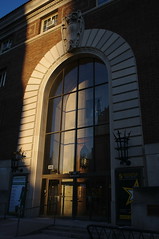 [Originally posted at Pittsburgh Symphony Blogs] As part of the Tchaikovsky Festival, some members of the PSO played in a recital on the University of Pittsburgh campus at Bellefield Hall. And, instead of playing pieces by Tchaikovsky, they played pieces by his contemporaries, starting with Anton Arensky. One thing that makes Arencky Piano Trio in D minor special is that there is an 1894 recording of a performance of the trio, with Anton Arensky playing his own piece on the piano. With him are violinist Jan Hřímalý (known by violin students for his Scale Studies) and Anoatoly Branukov.
[Originally posted at Pittsburgh Symphony Blogs] As part of the Tchaikovsky Festival, some members of the PSO played in a recital on the University of Pittsburgh campus at Bellefield Hall. And, instead of playing pieces by Tchaikovsky, they played pieces by his contemporaries, starting with Anton Arensky. One thing that makes Arencky Piano Trio in D minor special is that there is an 1894 recording of a performance of the trio, with Anton Arensky playing his own piece on the piano. With him are violinist Jan Hřímalý (known by violin students for his Scale Studies) and Anoatoly Branukov. Copeland in his book "What to Listen for in Music" states that in any piece of art, there are three actors. The composer, the interpreter (performer) and the listener. All three must do their part for a complete expression of a work. But it is fascinating to know that we have an depiction of how the composer interprets his own work. And preserved in a fashion that is not distorted by the twists of time and fashion which always occur over that period of time. At the recital, they played the recording from the Block cylinders (1894) after Ms. Orchard, Mr. Istomin and Mr. Vatchnadze performed the piece, giving us the opportunity to compare them both. And the style of play was notable in how different it was. While Hřímalý is known for his studies used to hone violinists technique, this performance is highly improvisational, taking great liberties with the rhythm, tempo, and even the written score. Almost surprising given how we view these greats.
What is different? The recordings by the original composer and his friends almost sounded like a jazz interpretation of his piece. The parts coming across as freeform expressions of personality instead of technical mastery and artistry. And if some student played like this in a recital or audition, they would surely have been snubbed.
I wonder if over the decades we have fallen completely victim to a tyranny of technique. It is very easy to hear a fast tempo performance and because the performer was even capable of hitting all the notes, in time and express the dynamics of the piece and declare it to be a great performance. And because it is easy to judge it on these quantifiable criteria, we value the mastery of techniques. Comparatively, it is considerably more difficult for us to judge artistry and expression which is not so easily quantifiable, we do not instinctively accept it as readily. And there are other fields where this is also true. The teaching of math has in many ways become the memorization of formulas and theorems. The teaching of history has become a memorization of facts, names and dates. The students subjected to this education rightly declare it useless, and the mathematicians and historians who see these students in college dispair that these students know nothing and are unable to think or reason. Despite being filled with useless facts and good test scores. And I question if this has made us better, whether it is understanding math, history or music.
No comments:
Post a Comment